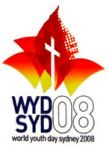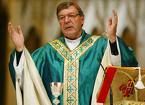 The next World Youth Days (WYD), a Catholic event organised every two or three years, will be held from July 15th to July 20th in Sydney, Australia. The Catholic Church isi expecting 125,000 international visitors and it will be the opportunity for the pope himself to visit Australia for the first time.
The next World Youth Days (WYD), a Catholic event organised every two or three years, will be held from July 15th to July 20th in Sydney, Australia. The Catholic Church isi expecting 125,000 international visitors and it will be the opportunity for the pope himself to visit Australia for the first time.I’ve asked Marion Maddox, an Australian scholar specialist in Churches-State relationships and director of the Centre for Social Inclusion at the Macquarie University in Sydney to tell us in what context these Days occur and what kind of impact they may have on an Australian youth who seems not likely to be interested in the conservative discourse of Benedict XVI.
 The Roman Catholic Church has chosen Sydney to hold its 2008 World Youth Days (WYD). Is there any chance this could attract young Australians?
The Roman Catholic Church has chosen Sydney to hold its 2008 World Youth Days (WYD). Is there any chance this could attract young Australians?I find it quite hard to understand what WYD is trying to achieve. It is presenting itself as aimed at youth, with a focus on freshness and modernity; but at the same time, it's a celebration of a certain kind of Catholic traditionalism. For example, Cardinal Pell has asked to have St Mary's Cathedral in Sydney designated as an official pilgrimage site which will entitle those who visit it for prayer
 during the WYD celebrations to a plenary indulgence; confessional booths are being set up around the city (despite the fact that, until recently pressured by Rome to restore the traditional confessional, Australian Catholics had scarcely used it, preferring the collective 'third rite' confession during Mass). I expect that the event will attract young Catholics, particularly those of a traditionalist mind-set, but it seems to have been designed more as an event for reinforcing Catholic identity than as an attempt to attract the unconverted.
during the WYD celebrations to a plenary indulgence; confessional booths are being set up around the city (despite the fact that, until recently pressured by Rome to restore the traditional confessional, Australian Catholics had scarcely used it, preferring the collective 'third rite' confession during Mass). I expect that the event will attract young Catholics, particularly those of a traditionalist mind-set, but it seems to have been designed more as an event for reinforcing Catholic identity than as an attempt to attract the unconverted.Does the organization of these WYD in Sydney interest Australians, beyond the Catholic circles?
The main impact WYD is having on non-Catholic Australians so far is negative. Newspapers are asking questions about the amount
 of government money supporting it; roads will be blocked and Sydney's already overstretched public transport system will be even more strained; city office workers have been asked to take the week off work if possible so as to minimise overcrowding; special laws impose a A$5000 fine for "causing annoyance" to WYD pariticipants; police have said that anyone participating in a protest (eg groups representing survivors of clergy sexual abuse) will have to have their placards and messages approved beforehand. All this has contributed to public cynicism and irritation.
of government money supporting it; roads will be blocked and Sydney's already overstretched public transport system will be even more strained; city office workers have been asked to take the week off work if possible so as to minimise overcrowding; special laws impose a A$5000 fine for "causing annoyance" to WYD pariticipants; police have said that anyone participating in a protest (eg groups representing survivors of clergy sexual abuse) will have to have their placards and messages approved beforehand. All this has contributed to public cynicism and irritation.Of course, this may change once the Pope arrives and the negative news stories are overtaken by positive events.
What is the current situation of the Australian Catholic Church? The pope himself seems to consider an attempt to reconquest part of the lost ground (the “new evangelisation”) rather than a visit to a conquered land.
 Australian Catholics are predominantly made up of three waves of migrants: first, poor Irish workers and convicts, and the clergy and religious who came to look after them; then, after World War II, southern European (especially Italian) workers; and, most recently, Catholics from Vietnam and other Asian countries.
Australian Catholics are predominantly made up of three waves of migrants: first, poor Irish workers and convicts, and the clergy and religious who came to look after them; then, after World War II, southern European (especially Italian) workers; and, most recently, Catholics from Vietnam and other Asian countries.Catholicism is Australia's largest denomination, with around 26% of the population, but Australia is culturally very secular and only a minority of that 26% would attend Mass regularly. While church attendance figures (for all denominations) have fallen since the 1950s, that was an unusually religious period; since European settlement, religion has played only a minor part in Australia's public culture and little or no part in national identity. So, if the Pope is attempting to regain 'lost ground', he might need to ask himself whether the church really ever had that much ground. Historically, Catholics suffered a lot of discrimination in Australia (for example, in employment) and were looked down on as poor and under-educated. The last half of the last century saw that turn around, with generous government support for Catholic schools, for example. Catholics used also to be strongly associated with the political Left (the Australian Labor Party). In terms of voting patterns that is still true, though not as strongly as in decades gone by. But Catholics, once extremely rare on the conservative side of politics, are now strongly represented in the parliamentary parties of the Right.
Is the Australian Catholic Church conservative or liberal?
Both; in recent years, the liberal voice has been more prominent, especially on issues of justice, peace and the environment. Catholic organisations were very important voices in drawing public attention to the previous government's harsh treatment of asylum seekers, for example, and have often been strong advocates for the poor, for workers'rights, and for Indigenous peoples.
 However, Australia's most senior Catholic, Cardinal George Pell, is generally regarded as conservative, particularly on theological issues but also on social issues. Also, different parts of the Catholic church have different political flavours. Some of the most prominent liberal voices represent religious orders rather than the church hierarchy, for example.
However, Australia's most senior Catholic, Cardinal George Pell, is generally regarded as conservative, particularly on theological issues but also on social issues. Also, different parts of the Catholic church have different political flavours. Some of the most prominent liberal voices represent religious orders rather than the church hierarchy, for example.It has to be said, too, that even the more liberal parts of the church are not always good at standing for the oppressed when the question concerns the church itself. A recent example is the letter from the Australian Catholic bishops unanimously criticising a retired bishop, Geoffrey Robinson, who wrote a book about sexual abuse in the Catholic church.
Is it right to say that Australia is a deeply secularised society?
Yes. Around 70% of Australians claim some religious belief or affiliation, but only a very small proportion make it a central part of their lives. Around 9% of Australians say they go to church weekly.
 In your book God under Howard(1), you explored the relations between politics and religion under the conservative government of John Howard. The new Labor Prime Minister Kevin Rudd presents himself as a strong Christian from Catholic origin but doesn’t seem to be willing to use it in politics. Does he exemplify the position of many Australian Catholics?
In your book God under Howard(1), you explored the relations between politics and religion under the conservative government of John Howard. The new Labor Prime Minister Kevin Rudd presents himself as a strong Christian from Catholic origin but doesn’t seem to be willing to use it in politics. Does he exemplify the position of many Australian Catholics?Actually, Kevin Rudd is an Anglican; he was raised a Catholic but became an Anglican in adulthood (though when I interviewed him in 1999, he told me that 'the possibility of doing a Cardinal Newman [ie converting to Catholicism] always remains'. He has talked a lot about his faith, particularly before he became Prime Minister. One of his early moves to establish a profile as a potential leader was to write a pair of magazine articles about the German Lutheran theologian Dietrich Bonhoeffer. (I suspect he might be the first Australian Prime Minister in a very long time who could even name a 20th Century theologian, let alone write a learned essay about one!) Since the election, his faith comes through less in explicit statements than in more symbolic ways; for example, his February 2008 apology to the 'Stolen Generations' (of Indigenous Australians taken from their families in childhood) had a decidedly liturgical feel. Mainline churchgoers tend to see religion as something that might well inform one's politics but about which politicians shouldn't be too explicit. For most of Australian political history, politicians thought so too. The recent interest in our representatives' personal faith partly reflects the Americanisation of Australian politics and an increased focus on politicians' personal features generally (marriage, family life, personality etc). Given that only a small proportion of voters actually do go to church regularly, we have to look for the wider effects of politicians' religiosity. God Under Howard argues that secular Australians quite like a certain amount of religiosity in our politicians. Politicians have a reputation for being cynical and self-serving; but, when they emphasise a religious identity, it reassures us that they stand for some higher set of values (even if they are values that few voters actually share).
Australia is a country of immigration. How the immigrations of the last three decades have influenced the profile of Australian Christianity, in particular Catholicism? More widely, what is the place of religious issues in the debates on multiculturalism?
Each wave of migration has brought a new ethnic dimension to Australian Catholicism. Also, each wave of migration has created a new group of easily-identified newcomers who can become the target of racist or other kinds of fears. At the moment, the big multicultural discussion about religion is to do with Islam. Ten or fifteen years ago, it was whether and how Indigenous peoples' religious traditions should be protected eg by laws preventing mining or development on sacred sites. Fifty years ago, the point of tension was antagonism between Catholics and Protestants (though the word 'multiculturalism' was not used back then). Religion itself is usually not important in such debates; often criticising religion is a way of distancing others without mentioning race.
1. Marion Maddox, 2005, God Under Howard. The Rise of the Religious Right in Australian Politics, Sydney, Allen & Unwin, 386 p.
Pictures of Sydney : Sydney Webcam.